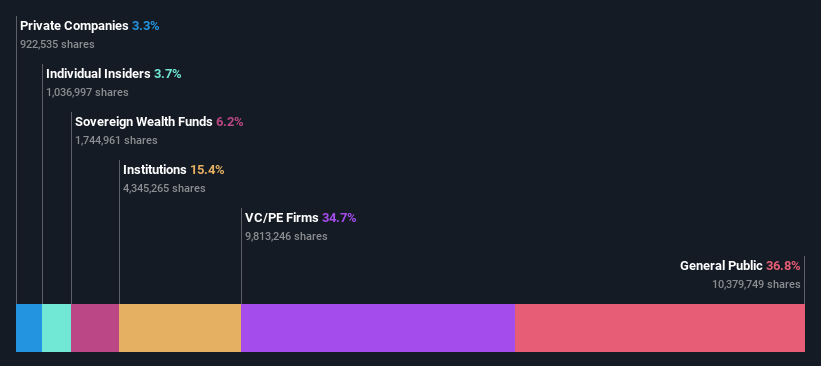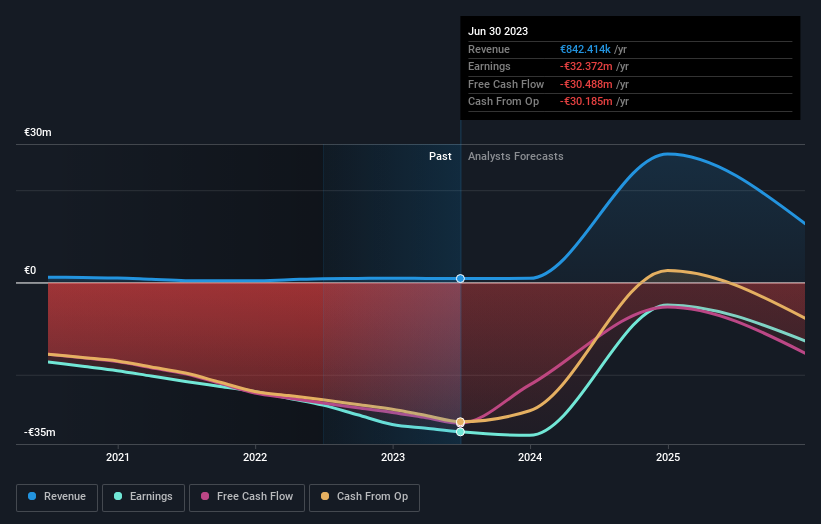- Belgium
- /
- Medical Equipment
- /
- ENXTBR:SEQUA
Individual investors among Sequana Medical NV's (EBR:SEQUA) largest shareholders, saw gain in holdings value after stock jumped 24% last week

Key Insights
- Sequana Medical's significant individual investors ownership suggests that the key decisions are influenced by shareholders from the larger public
- 53% of the business is held by the top 8 shareholders
- 15% of Sequana Medical is held by Institutions
If you want to know who really controls Sequana Medical NV (EBR:SEQUA), then you'll have to look at the makeup of its share registry. With 37% stake, individual investors possess the maximum shares in the company. That is, the group stands to benefit the most if the stock rises (or lose the most if there is a downturn).
As a result, individual investors were the biggest beneficiaries of last week’s 24% gain.
Let's take a closer look to see what the different types of shareholders can tell us about Sequana Medical.
See our latest analysis for Sequana Medical

What Does The Institutional Ownership Tell Us About Sequana Medical?
Many institutions measure their performance against an index that approximates the local market. So they usually pay more attention to companies that are included in major indices.
We can see that Sequana Medical does have institutional investors; and they hold a good portion of the company's stock. This implies the analysts working for those institutions have looked at the stock and they like it. But just like anyone else, they could be wrong. It is not uncommon to see a big share price drop if two large institutional investors try to sell out of a stock at the same time. So it is worth checking the past earnings trajectory of Sequana Medical, (below). Of course, keep in mind that there are other factors to consider, too.

Sequana Medical is not owned by hedge funds. Looking at our data, we can see that the largest shareholder is Partners In Equity B.V. with 13% of shares outstanding. In comparison, the second and third largest shareholders hold about 10% and 6.7% of the stock.
We also observed that the top 8 shareholders account for more than half of the share register, with a few smaller shareholders to balance the interests of the larger ones to a certain extent.
While studying institutional ownership for a company can add value to your research, it is also a good practice to research analyst recommendations to get a deeper understand of a stock's expected performance. Quite a few analysts cover the stock, so you could look into forecast growth quite easily.
Insider Ownership Of Sequana Medical
The definition of company insiders can be subjective and does vary between jurisdictions. Our data reflects individual insiders, capturing board members at the very least. Company management run the business, but the CEO will answer to the board, even if he or she is a member of it.
I generally consider insider ownership to be a good thing. However, on some occasions it makes it more difficult for other shareholders to hold the board accountable for decisions.
Shareholders would probably be interested to learn that insiders own shares in Sequana Medical NV. As individuals, the insiders collectively own €3.6m worth of the €98m company. Some would say this shows alignment of interests between shareholders and the board, though we generally prefer to see bigger insider holdings. But it might be worth checking if those insiders have been selling.
General Public Ownership
The general public-- including retail investors -- own 37% stake in the company, and hence can't easily be ignored. While this group can't necessarily call the shots, it can certainly have a real influence on how the company is run.
Private Equity Ownership
Private equity firms hold a 35% stake in Sequana Medical. This suggests they can be influential in key policy decisions. Some might like this, because private equity are sometimes activists who hold management accountable. But other times, private equity is selling out, having taking the company public.
Private Company Ownership
It seems that Private Companies own 3.3%, of the Sequana Medical stock. Private companies may be related parties. Sometimes insiders have an interest in a public company through a holding in a private company, rather than in their own capacity as an individual. While it's hard to draw any broad stroke conclusions, it is worth noting as an area for further research.
Next Steps:
While it is well worth considering the different groups that own a company, there are other factors that are even more important. Case in point: We've spotted 6 warning signs for Sequana Medical you should be aware of, and 3 of them are potentially serious.
Ultimately the future is most important. You can access this free report on analyst forecasts for the company.
NB: Figures in this article are calculated using data from the last twelve months, which refer to the 12-month period ending on the last date of the month the financial statement is dated. This may not be consistent with full year annual report figures.
New: Manage All Your Stock Portfolios in One Place
We've created the ultimate portfolio companion for stock investors, and it's free.
• Connect an unlimited number of Portfolios and see your total in one currency
• Be alerted to new Warning Signs or Risks via email or mobile
• Track the Fair Value of your stocks
Have feedback on this article? Concerned about the content? Get in touch with us directly. Alternatively, email editorial-team (at) simplywallst.com.
This article by Simply Wall St is general in nature. We provide commentary based on historical data and analyst forecasts only using an unbiased methodology and our articles are not intended to be financial advice. It does not constitute a recommendation to buy or sell any stock, and does not take account of your objectives, or your financial situation. We aim to bring you long-term focused analysis driven by fundamental data. Note that our analysis may not factor in the latest price-sensitive company announcements or qualitative material. Simply Wall St has no position in any stocks mentioned.
About ENXTBR:SEQUA
Sequana Medical
Develops and commercializes treatments for patients with diuretic-resistant fluid overload in liver disease, cancer, and heart failure in Belgium, Germany, France, Switzerland, and internationally.
Medium-low with limited growth.


